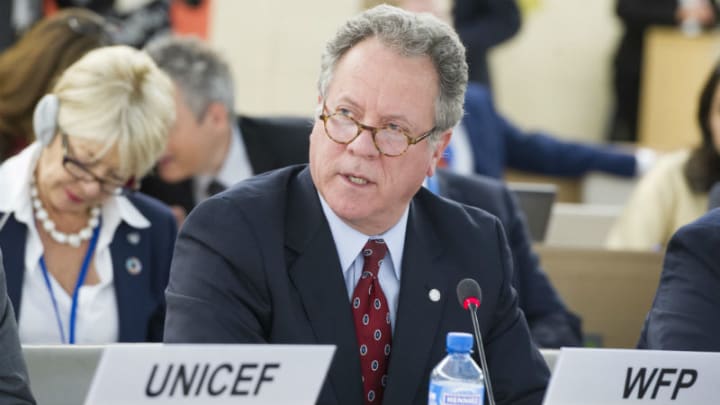
More details on U.S. assistance to Central America, Mark Green's trip to Africa, and a victory against the “commercialization of education.”
The U.S. government will allow $432 million of 2017 funding to be spent on development assistance in Central America, while reprogramming about $370 million of 2018 funding for other purposes, according to the State Department. The decision follows a review of 707 foreign assistance programs in El Salvador, Guatemala, and Honduras. In March, President Donald Trump demanded that the three countries’ governments stop citizens from leaving for the U.S., and he announced that the U.S. would cut off assistance until they do. That initiated an anxiety-inducing stretch during which U.S. aid implementers had little information about how their programs would be affected. On Monday, State Department spokesperson Morgan Ortagus offered a bit more clarity about which funding would be halted, but shed no more light on the criteria that will be used to decide when it can start flowing again. The decision came two days before the United Nations Refugee Agency announced a record 71 million people have been forcibly displaced from their homes.
The European Union’s flagship development event, European Development Days, seemed to be in an “interim year,” one of the nearly 9,000 registered participants told Devex. With European Commission President Jean-Claude Juncker’s tenure winding down, and the EU’s 2021-2027 budget still up in the air, the gathering pressed on nonetheless. Juncker took the stage Tuesday and repeated the annual mantra that the era of charity toward Africa is over — now it’s all about partnership. But Juncker won’t be there next year, and neither will Stefano Manservisi, the outgoing top bureaucrat at the commission’s development department, who told Devex he’d like to see EDD become more of a marketplace for investors to connect with people with projects. On Wednesday, about 50 EU aid insiders met for an informal breakfast and concluded that one important test of whether the bloc’s engagement with Africa has gone beyond rhetoric will be whether a strong candidate for EU development commissioner emerges from talks over the summer. Similarly, Senegal President Macky Sall suggested the development days, which began in 2006, could be held in cities in Africa, the Caribbean, or Pacific. Either way, the musical closing ceremony hinted at signs of life still remaining.
USAID Administrator Mark Green wrapped up a nine-day trip to Africa this week, including a visit to the North Kivu province of DRC, where he met with health care workers, community leaders, and NGO representatives. Green said the humanitarian response to Ebola in the DRC has failed to contain the virus, and said responders need to increase the transparency of their operations in order to “reset” these efforts. Green also attended a ribbon cutting ceremony in Mogadishu, where a permanent USAID mission reopened, 28 years after it closed. The move is part of U.S. efforts to revive ties with the East African nation. U.S. is the largest donor of humanitarian assistance to Somalia, providing nearly $672 million since 2018. The Trump administration also announced details about its Prosper Africa initiative, an effort to increase trade with Africa and compete with China and Russia on the continent.
In other U.S. news, after a bumpy few years without a permanent CEO, the Millennium Challenge Corporation now has a new leader in Sean Cairncross, who was confirmed by the Senate this week. And Kelly Knight Craft, U.S. ambassador to Canada, stated her case for becoming the next U.N. representative before the Senate Committee on Foreign Relations Committee on Wednesday.
World Food Programme Executive Director David Beasley said his organization may have to suspend food aid in Yemen due to a disagreement with the Houthis over beneficiary registration and the use of biometrics. When asked for further details on the timing of a possible suspension, WFP told Devex on Thursday they had no further updates beyond Beasley’s remarks to the U.N. Security Council on Monday. The Houthis have argued that the use of fingerprints, facial recognition, or iris scanning by WFP violate Yemeni law. WFP is assisting more than 10 million people with food aid in Yemen, where 20 million people need help securing food and 14 million people are in acute humanitarian need, according to OCHA.
The Global Partnership for Education will not allow its funds to be used to support private sector education initiatives unless under “exceptional circumstances.” The 40 member board of directors of GPE, the largest education fund in the world, agreed to the policy last week in Sweden, where they unanimously adopted a draft private sector strategy. That strategy stipulates that “no GPE funds can be used to support for-profit provision of core education services.” Civil society groups who have decried the emergence of private sector school chains in low-income countries — and the use of donor funds to support and encourage them — celebrated the decision. Others questioned why GPE should dictate educational policy choices, instead of leaving decisions about what to fund up to individual countries.




